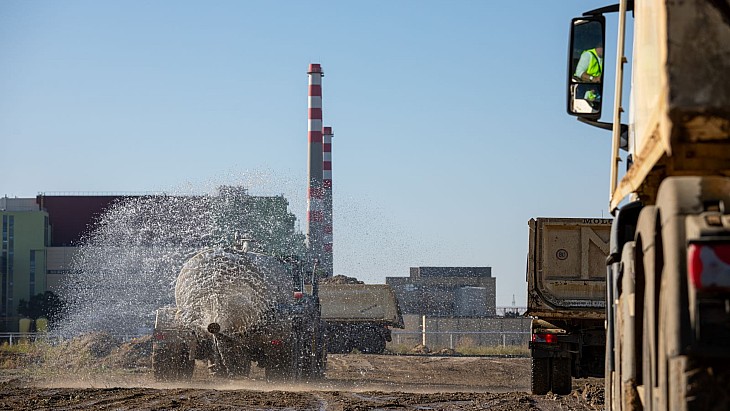
Szijjártó said that initial groundwork is now taking place to a depth of five metres, with some sections of the sixth block at the plant likely to be up to 23 metres deep to ensure its stability and safety. Similar work has already been carried out on the site of the planned fifth block at the plant, he added.
There are between 30 and 40 lorries involved in carrying the soil excavated from the site, which will total as much as one million cubic metres, he said.
Work began to construct the groundwater cut-off - an underground waterproof wall - around the area on Hungary's Paks nuclear power plant site where the two new units are to be built, in July. The wall will control the flow of groundwater into and out of the Paks II construction pit, once excavated. Szijjártó said about 700 metres of the wall had now been completed.
According to the official About Hungary report on Szijjártó's comments, the minister said that the work taking place on site, plus the work under way in Russia "means that the target of completing the project by 2030 remains realistic".
Earlier this year Energy Minister Csaba Lantos said in an interview with Kossuth Radio that the Paks II plant was likely to be completed two years later than planned, in 2032.
The Paks II project was launched in early 2014 by an intergovernmental agreement between Hungary and Russia for two VVER-1200 reactors to be supplied by Rosatom, with the contract supported by a Russian state loan to finance the majority of the project. The application was submitted in July 2020 to construct Paks II alongside the existing Paks plant, 100 kilometres southwest of Budapest on the banks of the Danube river. Procedures allowed Hungary's National Atomic Energy Office 12 months to make its decision, with the possibility of extension by three months. That extension was triggered in July 2021, but the construction licence was not finally issued for more than a year, in August 2022.
The existing four units at Paks are VVER-440 reactors that started up between 1982 and 1987 and they produce about half of the country's electricity. Their design lifetime was for 30 years but that was extended in 2005 by 20 years to between 2032 and 2037. In December, the Hungarian Parliament approved a proposal to further extend their lifespan, which means preparations can begin on operating the plant into the 2050s.
Hungary has said it plans to push ahead with the project with Russia, despite opposition to it from fellow European Union countries following the outbreak of the Russia-Ukraine war.
Rosatom said that the general contractor of the Paks II project, JSC Atomstroyexport, started work on the main stage of construction on 21 August, with Hungarian contractor Duna Asxfalt starting preparations for the excavation work under future unit 6. This followed the signing of amendments to the construction contract on 18 August and Paks II Nuclear Power Plant Ltd issuing "the relevant official notification on the transition of the project to the second, ie the main, construction stage".
It said that the excavation work at unit 6 would cover an area equal to about four football pitches and should be completed this autumn. The two new units are designed to have a lifetime of at least 60 years.